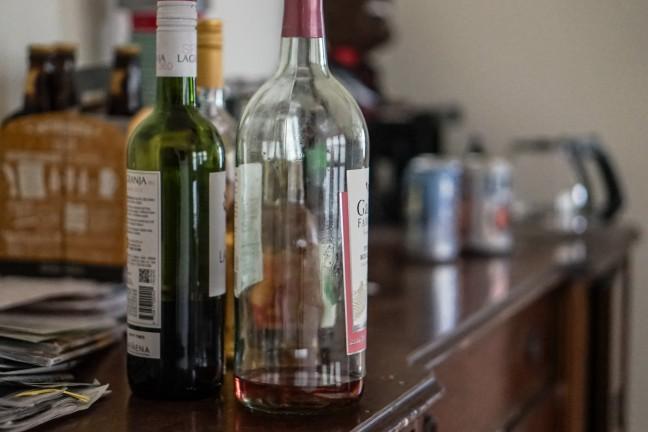The culture of binge-drinking in Madison has always been subject to scrutiny. The University of Wisconsin is infamous for underage drinking, large parties and hectic gameday celebrations. Whether it’s discussions of Mifflin, party-school rankings or ejections from Camp Randall, alcohol is always in the news.
For UW students, the balance between drinking and academics has always been precarious. Underage drinking, though prevalent, is penalized harshly; the price for detox, a ticket and a required alcohol education course add up to around a thousand dollars. Students caught drinking underage are also subject to removal from university housing, loss of scholarships and further charges.
With harsh penalties in place, and an increase in the issuing of drinking tickets, University of Wisconsin police have been taking a hardline stance against underage consumption of alcohol. Despite this, binge-drinking rates have held steady, with alcohol-related deaths rising in recent years. Hospital admissions for drinking, however, have been on a decline.
UW administration largely responsible for perpetuating drinking culture
In the face of costly punishment, many students have decided to forgo any help UWPD and emergency services can offer. Though some hope hardline policies would deter dangerous drinking, studies have demonstrated that the presence of harsh penalties has little to no effect on underage drinking rates.
A survey done of around 2,000 students at Miami University found that 61 percent of respondents said if a fellow student was in duress due to overconsumption of alcohol, they would be hesitant to call the police for help. A larger study done by Cornell University in 2000 reported that only four percent of those with an intoxicated friend in need of assistance called EMS.
In an attempt to address these shocking statistics, UW passed “Responsible Action” guidelines, giving amnesty to certain people in need of medical assistance. Students on University property who call UWPD for an intoxicated friend will not be subjected to drinking citations. Victims of sexual assault and human trafficking, per state law, are also granted medical amnesty for underage drinking.
However, these guidelines often fall short in fulfilling their purpose. Amnesty is granted on a case-by-case basis by UWPD, and only to students on University property. This means calls from Langdon street, Mifflin or off-campus house parties do not fall under amnesty guidelines.
UWPD has pushed back against changes to medical amnesty laws, often citing fears it would encourage drinking. Enduring the penalties of a drinking ticket holds students “accountable,” said UWPD spokesperson Marc Lovicott.
In 2013 Senator Fred Risser brought legislation that would extend amnesty to the intoxicated student called for, instead of just the caller. The legislation eventually failed.
At a recent UWPD forum, the gaps in the Responsible Action Guidelines were brought up by students. UWPD officials reiterated that their intention was not to write citations but to get students the assistance they needed.
However, with an increase in citations being issued, and a reluctance to address problems caused by RA Guidelines, this claim seems half-hearted at best. As concerned students, we leave with important questions: If empirical research has indicated heavy-handed policies on drinking do nothing to deter behavior, then why does UWPD continue to promote a hardline stance on underage drinking? When the same studies have indicated an abstinence-style education on alcohol is less effective than safe drinking programs, why does UWPD continue to require these programs for offenders?
In essence, faced with serious policy failures, why has UWPD refused to change?
Merely telling students to avoid alcohol completely is a fruitless attempt to curb drinking. Facing the reality that students will drink — and eventually over-drink — is the only way to address the dangers of underage consumption. Educating students about destructive behavior, such as binge drinking, is far more effective than telling them not to drink at all.
Most importantly, changes to medical amnesty laws are crucial. The previously mentioned study completed at Cornell found that, after the extension of amnesty to the victim and caller, there was a 51 percent increase in calls to EMS. New laws across the country appear to be successful when implemented, so why aren’t we changing our own?
If we look past the supposed immorality of underage drinking and those who participate in it, at the end of the day, this is a story about safety. In a perfect world, students would face full legal consequences for underage drinking. They would learn their lesson and be reluctant to repeat their mistakes. In reality, calling for help is always complicated. There are scholarships, money and futures at stake.
Because of the perceived consequences of UWPD policies, many students choose to put these items over their safety. In some situations, like those where the victim is unconscious, the choice is up to the caller. Because penalties are so severe, there is always a moment of hesitation — one that has, and continues to cost lives.
But a person’s life and safety should never be a decision weighed in the basements of frat houses or in the alley outside of a house party. Students should never be afraid to call 911, whether for a friend, or themselves. Giving students the tools to make better choices will help build a relationship of trust between UWPD and its community. It should be one built on education and advocacy — not punishment and abstinence programs.
The creation of new expanded medical amnesty laws is long overdue. It’s time to move forward, and adopt a more progressive stance on how we address underage drinking; lives might very well be at stake.
Julia Brunson ([email protected]) is a sophomore majoring in history.





















